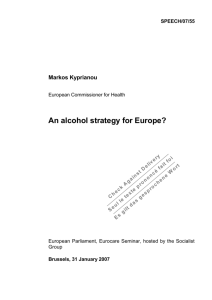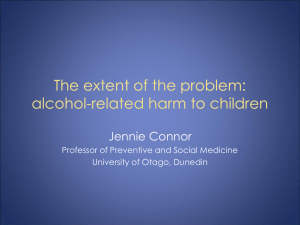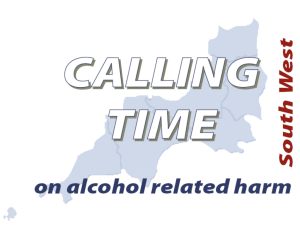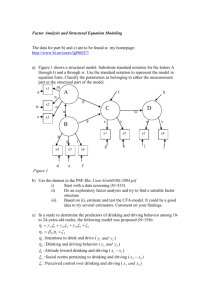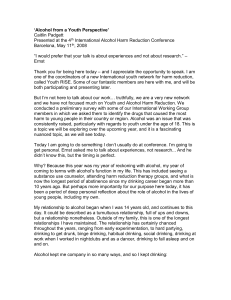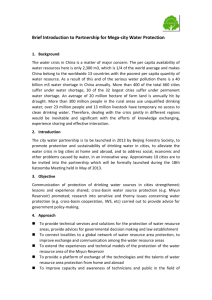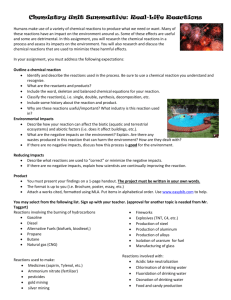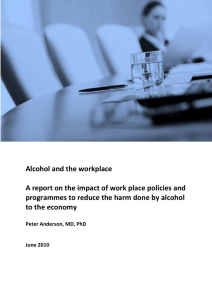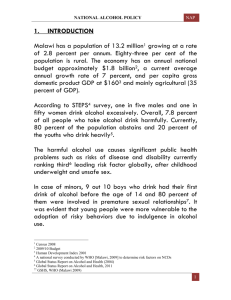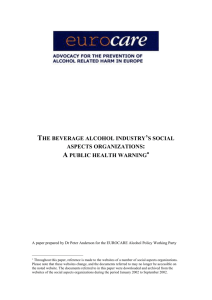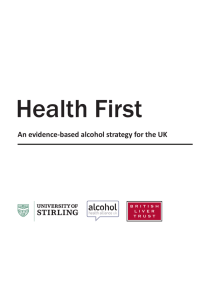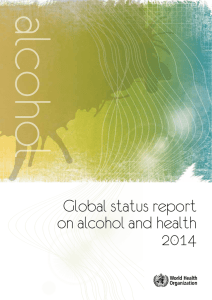DOC - Europa
advertisement
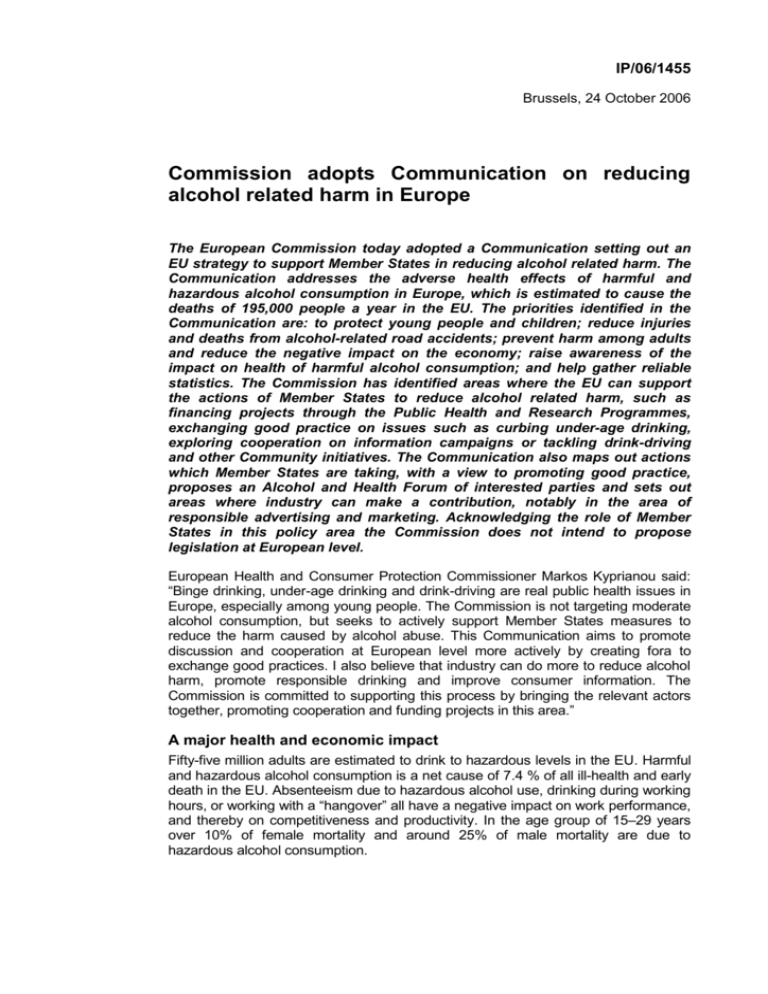
IP/06/1455 Brussels, 24 October 2006 Commission adopts Communication on reducing alcohol related harm in Europe The European Commission today adopted a Communication setting out an EU strategy to support Member States in reducing alcohol related harm. The Communication addresses the adverse health effects of harmful and hazardous alcohol consumption in Europe, which is estimated to cause the deaths of 195,000 people a year in the EU. The priorities identified in the Communication are: to protect young people and children; reduce injuries and deaths from alcohol-related road accidents; prevent harm among adults and reduce the negative impact on the economy; raise awareness of the impact on health of harmful alcohol consumption; and help gather reliable statistics. The Commission has identified areas where the EU can support the actions of Member States to reduce alcohol related harm, such as financing projects through the Public Health and Research Programmes, exchanging good practice on issues such as curbing under-age drinking, exploring cooperation on information campaigns or tackling drink-driving and other Community initiatives. The Communication also maps out actions which Member States are taking, with a view to promoting good practice, proposes an Alcohol and Health Forum of interested parties and sets out areas where industry can make a contribution, notably in the area of responsible advertising and marketing. Acknowledging the role of Member States in this policy area the Commission does not intend to propose legislation at European level. European Health and Consumer Protection Commissioner Markos Kyprianou said: “Binge drinking, under-age drinking and drink-driving are real public health issues in Europe, especially among young people. The Commission is not targeting moderate alcohol consumption, but seeks to actively support Member States measures to reduce the harm caused by alcohol abuse. This Communication aims to promote discussion and cooperation at European level more actively by creating fora to exchange good practices. I also believe that industry can do more to reduce alcohol harm, promote responsible drinking and improve consumer information. The Commission is committed to supporting this process by bringing the relevant actors together, promoting cooperation and funding projects in this area.” A major health and economic impact Fifty-five million adults are estimated to drink to hazardous levels in the EU. Harmful and hazardous alcohol consumption is a net cause of 7.4 % of all ill-health and early death in the EU. Absenteeism due to hazardous alcohol use, drinking during working hours, or working with a “hangover” all have a negative impact on work performance, and thereby on competitiveness and productivity. In the age group of 15–29 years over 10% of female mortality and around 25% of male mortality are due to hazardous alcohol consumption. This is also the cause in 16% of cases of child abuse and neglect. Exposure to alcohol during pregnancy can impair brain development and is associated with intellectual deficits. Approximately one accident in four can be attributed to alcohol consumption, and about 10,000 people are killed in alcohol-related road accidents in the EU each year. Commission action In cooperation with Member States and stakeholders, the Commission will develop strategies aimed at curbing under-age drinking, by exchanging good practice on issues like selling and serving, marketing, and the image of alcohol use conveyed through the media. Through its Public Health Programme, the Commission will support projects that will contribute to reduce alcohol-related harm in the EU, and especially the harm suffered by children and young people, as well as gathering and disseminating data. It will support the monitoring of young people’s drinking habits, with a focus on the increased drinking of alcohol among girls and binge-drinking. The Commission will explore, in cooperation with Member States and stakeholders, the usefulness of developing efficient common approaches throughout the Community to provide adequate consumer information. Such reflections are particularly important as some Member States are planning to introduce warning labels (e.g. on alcohol and pregnancy). It will support Member States and stakeholders in their efforts to develop information and education programmes on the effect of harmful drinking. Through the EU Research Framework Programme, the Commission will launch research on young people’s drinking habits in order to analyse current trends and motivations for drinking, as well as the wider determinants of youth drinking. Mapping out national action with a view to promoting good practice Member States have the main responsibility for national alcohol policy. The Commission’s role is to encourage cooperation and coordination between Member States, and to complement their activities, for example through the funding of projects. The Communication maps out measures adopted by Member States to tackle alcohol related harm, which can facilitate the dissemination of good practice across the EU. Examples of national measures identified in the Communication include: action to improve consumer information at point of sale, on products or at the workplace; action to better enforce age limits for selling and serving alcohol; education of young people and parents; introducing a lower or zero blood alcohol concentration limit for young or inexperienced drivers, and for professional drivers; and enforcing counter-measures against drink-driving. Follow-up and consistency with other policies The Commission will also set up: - an “Alcohol and Health Forum” by June 2007, to support, provide input and monitor the implementation of the strategy outlined in the Communication. The Forum will focus on topics such as research, information and data collection, and education. - the Commission will also improve coordination between drink-driving and road safety actions including those supported by the Public Health Programme and the Action Plan on Road Safety, to help reduce alcohol-related road accidents, and with a particular view to combating drink-driving. This will in particular address the issue of novice and young drivers. 2 - the Commission services will work with stakeholders to create sustained momentum for co-operation on responsible commercial communication and sales. The main aim will be to support EU and national/local Government actions to prevent irresponsible marketing of alcoholic beverages, and examine data about trends in advertising. One aim will be to reach agreement with stakeholders on a codes of commercial communication implemented at national and EU level. The Commission considers that its main contribution to the strategy should be based on the existing approach of complementing national strategies in this area and therefore does not intend to implement the strategy through specific new legislative proposals. The Commission will report regularly on the implementation of measures to tackle harmful and hazardous alcohol consumption, as well as on the impact of the EU strategy set out in this Communication, based on regular reporting from Member States. 3

